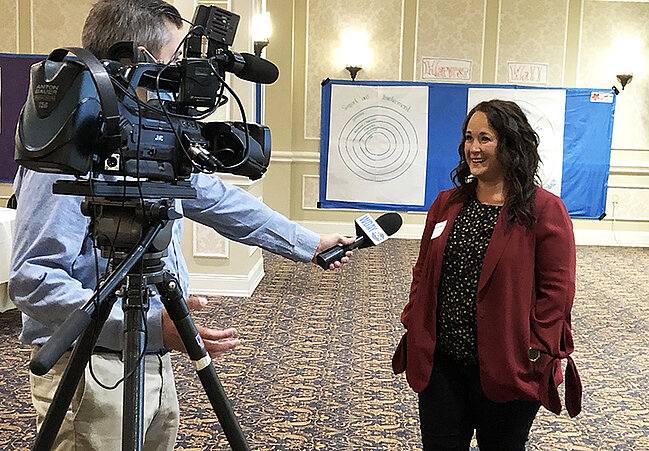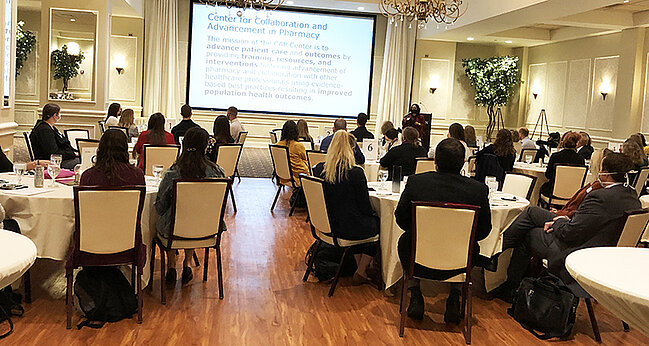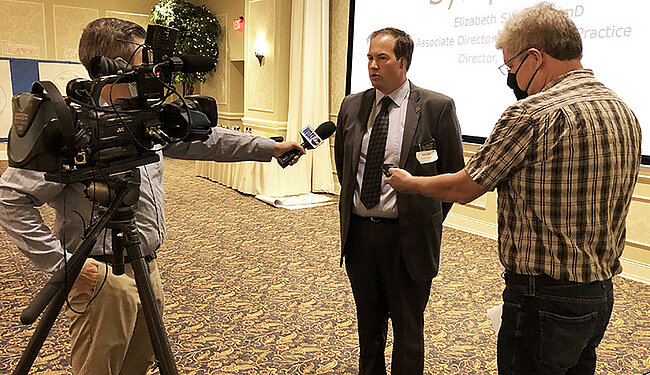Building on an approach developed for its nationally-recognized Opioid and Naloxone Education program for pharmacists, NDSU has established the Center for Collaboration and Advancement in Pharmacy, known as the CAP Center.
The new CAP Center focuses on helping healthcare teams develop tools and sustainable programs that can improve the health of North Dakota residents.
The goal is to advance patient care through training, resources, and interventions that are based on data-driven research, according to Dr. Elizabeth Skoy, director of the new CAP Center and associate professor of pharmacy practice at NDSU.
“What we learned with the success of the ONE program is a process to identify a patient care need, provide education, training, programs and implementation, coaching, support, and continuing education to help improve the lives of patients and communities,” said Skoy. “This process can now be used in the CAP Center to impact other health issues facing North Dakotans.”
In addition, the CAP Center will provide NDSU students in health professions with experiences that will prepare them to work at the top of their professional license upon graduation.
“We invite potential collaborators and researchers to work with us to create meaningful and sustainable change to better people’s overall health,” said Dr. Amy Werremeyer, chair of the NDSU Department of Pharmacy Practice. “This is an opportunity to enhance current programs or create new and sustainable initiatives in collaboration with pharmacists and other members of the healthcare team.”
Examples of the types of programs that can be enhanced or advanced through CAP include screening for diabetes, medication therapy management, identifying drug interactions, making it convenient to receive vaccinations, tobacco cessation, remote patient monitoring, and chronic disease management.
A previous report from the North Dakota Department of Health showed nearly one in three adults in the state diagnosed with high blood pressure and more than 80 percent taking medication for it.
In addition, nearly one in 12 adults in the state were diagnosed with diabetes, but the state lags in having enough healthcare professionals to help with diabetes management, according to the 2016 report. Further collaboration across the healthcare sector could assist in management of many chronic conditions, according to CAP representatives.
“Through federal grant funding distributed through the North Dakota Department of Health and the Department of Human Services, a statewide working group will provide training to other state agencies that builds on pharmacy’s preventative approach to care, with North Dakota leading the way for this model,” said Skoy.
“Pharmacists are often the most accessible healthcare professional to patients, especially in rural communities,” said Dr. Mark Hardy, executive director of the North Dakota Board of Pharmacy. “The CAP Center provides opportunities for many healthcare disciplines to work together to find ways to enhance their patients’ overall health.”
The Center will prioritize research that can be feasibly upscaled, impact population health, and be translatable to other settings.
“Results of programs will be measured to determine their impact, make adjustments, and provide data-driven research of programs and interventions launched,” according to Dr. Mark Strand, senior scientist for the Center for Collaboration and Advancement in Pharmacy, and professor in Pharmacy and in Public Health at NDSU.
Details about the Center were announced at the CAP Center Collaboration Symposium on September 17 at the Avalon Events Center in Fargo.
As a student focused, land grant, research university, we serve our citizens.





